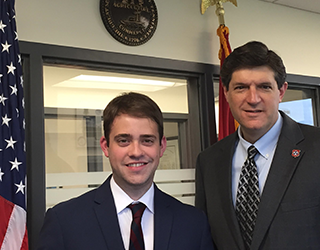After studying abroad in Durban, Republic of South Africa and finishing a Chemistry degree at University of Pennsylvania, Tim Nielsen sought further study in global epidemiology stemming from his passion for preventing unintended pregnancies and improving birth outcomes. He was selected as a “Pathways to Practice Scholar” of the Region IV Public Health Training Center largely due to his shared passion of maternal and child with his mentor, John Dreyzehner, MD, MPH, FACOEM – Commissioner of Health for the State of Tennessee.

Timothy Nielsen with his mentor, John Dreyzehner, MD, MPH, FACOEM, the Commissioner of Health for the State of Tennessee
His internship was focused on prevention of neonatal abstinence syndrome (NAS), a collection of withdrawal symptoms affecting newborns exposed to certain substances in utero, particularly opioids and benzodiazepines. Tennessee is experiencing a NAS epidemic, with an eleven-fold increase in the NAS hospitalization rate between 1999 and 2011. Timothy conducted structured interviews with key informants from various state agencies and healthcare providers in order to make policy recommendations. His recommendations included expanding education to providers concerning risks of opioid prescription, connecting mothers to resources, standardizing follow up, and increasing funds for substance abuse treatment programs, particularly with a family centered approach.
Timothy shared, “I appreciated the opportunity to address the problems affecting Appalachian people, a population that I am passionate about as a native Kentuckian…Commissioner Dreyzehner did a fantastic job of making sure I had the opportunity to see as much of the department as possible and interact with individuals at the state, regional, and local level. Over the course of the internship, I learned three important lessons about the practice of public health:
- A health department should be nonpartisan, but does not exist outside of politics.…when you leave management up to someone else you lose control of setting priorities…
- Primary prevention should be a guiding principle in health policy.…I got to see firsthand how funding is skewed towards healthcare rather than health promotion…
- Community engagement is key to improving health.
The biggest takeaway from my internship, was the effect that a community has on an individual’s health….One of the more striking moments of the summer was speaking with a substance abuse counselor who somberly explained how a community will rally around a member with a physical illness, but will scatter from a member suffering from a mental illness like addiction.
My experience has reaffirmed my desire to work with and on behalf of underserved populations. I sought out my current fellowship program working with a state health department because of the positive experiences I had during the program. I strongly believe that I want to pursue a career in public service, most likely at the state or local level.”
Timothy is currently an Applied Epidemiology Fellow of the Council of State and Territorial Epidemiologists (CSTE) at the Maternal Child Health at Massachusetts Department of Public Health.
